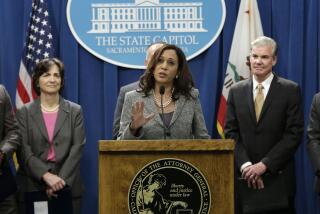Tokens of Our Esteem : In his new attorney general, Clinton can show he understands that representation means more than skin color.
âTo get anywhere in this world, a Negro will have to be twice as good as the white man.â
Or three times or 10 times. Pick your equation, attribute it to whomever. Born in the early â50s, it was a mantra I heard over and over again. When integration finally became the norm, we were warned we would have to be better than competent to be allowed to compete on the playing fields of white America. First-and-only barrier-breakers did not have the luxury of being ordinary; they had to be extraordinary.
So back then, when only one of us was allowed to squeeze through into professions and arenas heretofore barred to us, we knew the common denominator for all the barrier-breakers was excellence. Such tenacity and preparedness gave us Jackie Robinson, Thurgood Marshall and Leontyne Price; Gen. Benjamin O. Davis, Judge Constance Baker Motley and athlete Althea Gibson. We could point with pride to our icons of accomplishment, because we knew each had impeccable credentials. And, just as important, we knew they felt a connectedness to us. They were our heroes, we were their people.
In the sense that they were representative of the rest of us, our hopes and aspirations of how far we could go if we applied ourselves--and if America imposed no limitations upon us--these people were, in the most positive sense, tokens. Symbols. Badges of achievement for the communities from which they came. They served as inspiration for several generations behind them, and repaid us handsomely by never forgetting who we were.
Often, the barrier-breakers had, at least in part, been chosen by their own community. It was, for example, no accident that Rosa Parks, with her unblemished background and unassailable dignity, was the first black woman to refuse the traditional seat in the back of the bus. Her people knew Parksâ history and family, and also knew she was eminently suited to step over the racial line of demarcation that ruled Birminghamâs public-transportation system.
Decades later, the firsts-and-onlys have pushed wider the doors that guard the pathways to success in mainstream America. Their courage and competence shoved the barriers further, so that African-American lawyers, executives, doctors and military officers are no longer rarities. Many are hard-working achievers who themselves have become role models for other young people. Many retain the connection to community that my early role models did.
The eminently qualified now exist in significant numbers, and they are not only African-American, but also Latino, Asian-American and native American--and they come in both sexes. There are enough of them in many parts of the country that the old excuse, âWeâd love to, but we canât find one whoâs qualified,â rings more hollow each time itâs used.
George Bush made a serious mistake in assuming that Clarence Thomas would be acceptable to African-Americans simply because he has brown skin. Ethnic groups have become sophisticated enough that we want more than someone who merely looks like us--we want someone who cares about us as well. There were enough qualified African-American judges from whom to choose--Republican and Democrat, conservative and liberal--that the former President could, and should, have done much better.
Bill Clinton, if heâs brave enough, has the chance to do just that. Zoe Bairdâs withdrawal opens the field for candidates from several races and both sexes who are taint-free. Clinton has petulantly protested that he will not succumb to the âbean-countersâ when it comes to filling the attorney generalâs seat, and I have to agree with him. Although Iâm an African-American feminist, I donât much care if the new attorney general stands or sits in the bathroom, uses a fine-toothed comb or an Afro pick when grooming. I am concerned about whether he or she will fairly represent people who have traditionally been on the margins of society; who believe the law protects only those with power and money, and who feel that justice is an abstract concept, not an American given. If Clinton can choose someone with those credentials, he--and we--will be much better off.
More to Read
Sign up for Essential California
The most important California stories and recommendations in your inbox every morning.
You may occasionally receive promotional content from the Los Angeles Times.










